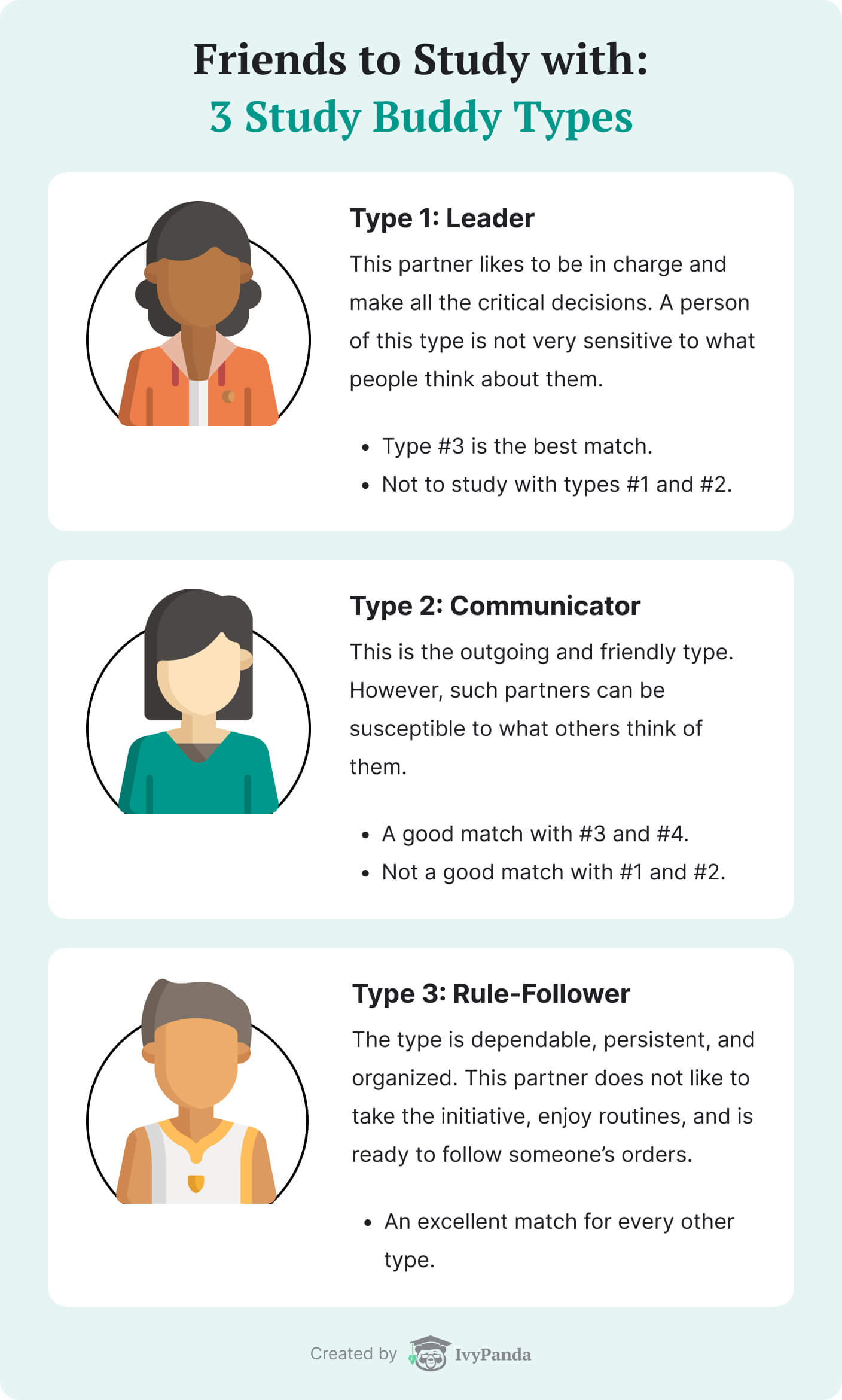Studying with friends can transform any dull academic task into a collaborative and enriching experience. The benefits of studying with friends include an improved perception of complex topics, boosted motivation, and the opportunity to exchange diverse perspectives. Besides, study groups help individuals stay on track with their goals.
When learning with friends, you can also clarify doubts and practice effective communication. That is why knowing how to study with someone, be it a friend or a partner, is an essential skill that we are going to teach you in this article. Explore the benefits of having a study buddy and discover helpful strategies and tips.
Who Is a Study Buddy Exactly?
We’ve already mentioned that a study buddy is a friend with whom you can prepare for tests and exams. But we’d like to dive deeper! Let’s explore the phenomenon in detail and figure out what it means to be one.
A study buddy should have these qualities:
- Empathy. A good study buddy is someone who understands your emotions, especially stress, that can be caused by upcoming exams. In an ideal case, both of you should experience the same challenges to understand each other better.
- Patience. Sometimes, it takes a long time to grasp new material. A reliable study buddy is someone who can withstand stress and overcome the difficulties of the process successfully.
- Enthusiasm. A study buddy is someone who energizes you and motivates you to achieve your goals. This type of friend will always support and encourage you.
- Self-organization. The ability to schedule a workload properly is the key to success. Therefore, a study buddy should be able to manage their time wisely and learn the material needed for an exam.
Most students spend time studying after school. They do homework, prepare for exams, or revise their notes for better comprehension. So, what are these study sessions like?
- Study Buddy vs. Study Group
There are two options for a joint study session:
- With a study buddy,
- In a study group.
You have to decide for yourself which option is the most convenient for you. Keep in mind that if you choose to study with several people, your group shouldn’t be too big. Make sure it is small enough so that everyone has the opportunity to ask questions and understand the material.
In fact:
Organizing a large group of students is tricky. Thus, follow the principle of quality over quantity. Stick to a small but supportive group of people, and your studying process will be very productive.
- Study Buddy vs. Studying Alone
You might think you don’t need a study partner at all. Many students believe that studying alone is more effective and convenient because they do not need to adapt to anyone. And this is absolutely normal!

For example, you could study separately and call at a later time to quiz each other. Or you could agree to start at a specific time to increase your motivation. There are many options! Come up with several you like and try them out.
In any case, try to study with a friend when you can. There are so many benefits to this interaction, which we’ll talk about below.
9 Reasons to Get a Study Buddy
There are several reasons why you should think of finding a study buddy or a study group. Check them out in our infographic below.
As you can consider, the benefits of studying with a friend are the following:

How to Study with Friends: Essential Tips
Now that you’ve learned about all the benefits of studying with your friends let’s see how to start. First and foremost, you need to become a good study buddy yourself. This way, the extra effort that your friends put into studying with you can pay off for them too.
In the following several sections of this article, we’ll explain in detail how to be productive while studying with someone. We’ve got you covered every step of the way: from choosing a buddy to organizing and navigating your study sessions.
7 Tips on Selecting a Study Buddy
Choosing a study buddy can be a confusing process. In this section, we’ve gathered tips to help you select the absolute best one for you.
There are several types of study buddies. Depending on your personality, you’ll want to look for different characteristics that make someone a good partner for you in your study process.

Besides, we’ve listed a few things you should take into account when selecting a friend to study with:
- Compatibility.
Before choosing your study buddy, ask yourself some personal questions:
- Do you like to chat during your study session?
- Are you a team player?
- Do you enjoy working in silence, or do you want to discuss the new information actively?
Asking these questions before choosing a study buddy is essential because these qualities will determine how successful your study results will be. Do not choose a study buddy based on your shared interests or hobbies. Instead, consider how well your study styles match each other.
- Availability.
Another essential point to consider is your schedule – you want to find someone who has a similar one. If your potential study buddy lives too far away or works inconvenient hours, then it might be better to look for someone else.
- Attitude.
It would help if you found someone who respects your time and schedule. Study partners should make things easier for each other. Who needs additional stress? Choose someone punctual, organized, and motivated.
- Approach.
There is a significant difference between study partners and tutors. Remember that you don’t have to be a teacher to your study buddy and explain all the given material. The goal should be to find someone who matches your academic level. Otherwise, you will spend all your time doing someone else’s work.
- Distractibility.
A good partner should be beneficial for your study process. They should not be the ones distracting you. Thus, find someone who is as motivated and goal-driven as you. Having your best friend as your study buddy might not be the best idea. If you have too much fun together, it might be challenging to focus on the studies.
- Skills
The best scenario would be finding someone who knows what you don’t know and vice versa. In this case, you can help each other with the study material. For instance, you know someone who is excellent with constitutional law but does not know torts that well. Your understanding of torts can help your study buddy, and their knowledge of constitutional law can fill your educational gaps.
- Mindset.
Maintaining a positive outlook is essential. All of us can get scared and unmotivated at times. That’s why it is critical to choose someone whose spirit can boost your confidence and mood.
What’s more, today you don’t have to look for a study buddy in your group or college. You can find various helpful apps and websites that can get you a partner online on the Internet.
For example:
1) StudyBuddyMobile will help you find a study buddy and find free tutoring on your campus. There is also a way to select students who prepare for the same exam, such as GRE, GMAT, etc.
2) Mooclab is another tool that students can use to find the best study pal. All you have to do is sign up, search based on your preferences, and connect with the matched people. It can also help you find a study group. However, it is not easy to use if you want to find someone immediately.
3) StudyPal is a service with a slack chat, a Zoom channel, and a network of tutors who aced the test you are preparing for. If you want to access all of these features, you will be asked to upgrade your account to premium for just 10 dollars. Nevertheless, if you don’t spend additional money on the study buddy service, there are many free services available.
Some universities realized the tremendous benefit of having study groups and including this feature in their campus apps. They allow students who take the same course to indicate their interest in studying outside of the classroom. Academic Support Centers at other colleges started launching programs with the same intention.
For instance:
Brigham Young University in Idaho created a program called Study Buddy. This specific program offers a one-on-one tutoring solution for those students who need some extra motivation and help.
How to Be a Friend to Study with
Collaborative learning is a process that requires the involvement of each participant. That is, if you want to have a great study buddy, you have to become one yourself. And here we will explain to you how to do it.
Studying with Buddies: Step by Step
Finally, we can move on to the highlights of learning with friends. This section provides you with a step-by-step guide for conducting study sessions when working with one or more people.
First things first, you need to choose a suitable partner for studying and prepare yourself for this responsibility. You can’t skip this step if you want to excel in collaborative learning. We have described all the tips in detail in the previous sections.
To navigate a study session, you should follow these steps:
Step 1: Pick the location.
Choose a convenient place to meet and study. This could be a free classroom in a college, someone’s room in an apartment or dorm. Now, you can meet on Zoom or Skype for collaborative learning.
Step 2: Create a schedule.
It is necessary to devote specific time to your study sessions. Agree on a particular period to conduct your study sessions. Create a shared file with a schedule where all of you can make changes.
Step 3: Choose what to study in advance.
Set a specific goal of what you need to do. You can’t be studying everything at once. Divide the material between each other beforehand.
Step 4: Share your notes and resources.
Sharing valuable resources and clear notes is necessary. It might lead to a better understanding of the material for both of you. If you share your notes, your partner will share theirs. Apart from that, you can both look up informative essay examples that might be useful for studying a particular subject or topic. Exchange what you’ve found afterwards.
Step 5: Plan time for studying and breaks.
You can’t be studying all the time. Devote some time for collaborative and individual study sessions, as well as for some rest time. Also, take some breaks during actual meetings to not overwork.
Step 6: Be prepared for each session.
If you’ve agreed on anything to do during previous sessions, do it. Complete all the tasks you’ve decided to do. Make notes to discuss specific questions.
Step 7: Communicate.
Make sure to actually talk to your study buddy. Your understandings and thoughts might be different, and it’s vital to share them. There’s no point to gather and read the information in silence.
Step 8: Consider tutoring each other.
Explaining a topic in your own words is an effective way to learn it. Try taking in turns and teaching each other specific issues. Every participant will benefit from such sessions.
Step 9: Test and assess each other.
Make regular quizzes. That’s a helpful method of evaluating one’s process of studying. Plus, it’s useful for group sessions.
Step 10: Agree on the deadlines.
If you’re in the course together, it is necessary to go over the material and schedule some deadlines to be on track. Having a shared goal and due date will increase productivity and keep you focused. However, you also need to plan some individual study sessions.
Thank you for reaching the end of the article! We hope you found it helpful, and now you know for sure if you need a study buddy. Share this article with potential candidates for this role to keep them interested.
References
- Navigate Study Buddies – Washburn University, Kansas DegreeStats
- Study Groups – Learning Center, the University of North Carolina at Chapel Hill
- 5 Tips for an Effective Study Group – David Eccles School of Business, the University of Utah
- How Can a Study Buddy Help You Succeed – RMIT University
- Study Buddies – The Graduate School, the University of Texas at Tyler
- 10 Reasons Why You Should Form a Study Group – Florida National University
- Study Groups: Learning Centers – Rutgers, the State University of New Jersey
- Study Groups – Anderson University, Anderson Indiana
![Studying with Friends: Why You Need a Study Buddy [+Tips]](https://ivypanda.com/blog/wp-content/uploads/2021/07/doing-homework-together-736x491.jpg)



I study
Thanks for your feedback, Negeti!